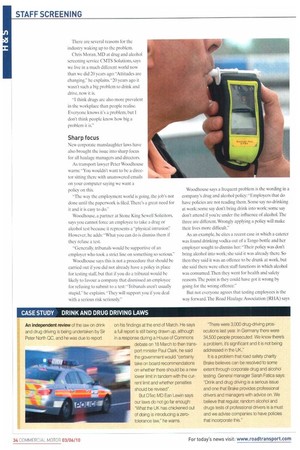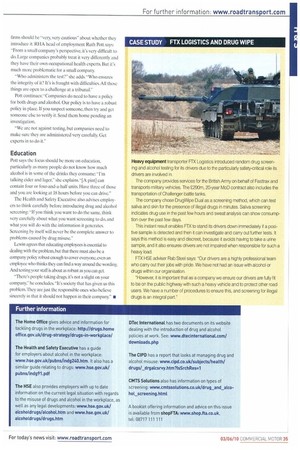There are several reasons for the industry waking up to the problem.
Page 34

Page 35

If you've noticed an error in this article please click here to report it so we can fix it.
Chris Moran, MD at drug and alcohol screening service CMTS Solutions, says we live in a much different world now than we did 20 years ago: -Attitudes are changing," he explains."20 years ago it wasn't such a big problem to drink and drive, now it is.
"I think drugs are also more prevalent in the workplace than people realise. Everyone knows it's a problem, but I don't think people know how big a problem it is."
Sharp focus
New corporate manslaughter laws have also brought the issue into sharp focus for all haulage managers and directors.
As transport lawyer Peter Woodhouse warns: "You wouldn't want to be a director sitting there with unanswered emails on your computer saying we want a policy on this.
-The way the employment world is going. the job's not done until the paperwork is filed.There's a great need for it and it is easy to do."
Woodhouse, a partner at Stone King Sewell Solicitors, says you cannot force an employee to take a drug or alcohol test because it represents a -physical intrusion': However, he adds: "What you can do is dismiss them if they refuse a test.
"Generally tribunals would be supportive of an employer who took a strict line on something so serious.
Woodhouse says this is not a procedure that should be carried out if you did not already have a policy in place for testing staff, but that if you do a tribunal would be likely to favour a company that dismissed an employee for refusing to submit to a test: "Tribunals aren't usually stupid," he explains "They will support you if you deal with a serious risk seriously." Woodhouse says a frequent problem is the wording in a company's drug and alcohol policy: "Employers that do have policies are not reading them. Some say no drinking at work; some say don't bring drink into work; some say don't attend if you're under the influence of alcohol. The three are different. Wrongly applying a policy will make their lives more difficult."
As an example, he cites a recent case in which a caterer was found drinking vodka out of a Tango bottle and her employer sought to dismiss her: "Their policy was don't bring alcohol into work; she said it was already there. So then they said it was an offence to he drunk at work, but she said there were often staff functions in which alcohol was consumed.Then they went for health and safety reasons. The point is they could have got it wrong by going for the wrong offence."
But not everyone agrees that testing employees is the way forward, The Road Haulage Association (RHA) says firms should be "very, very cautious" about whether they introduce it. RHA head of employment Ruth Pott says: "From a small company's perspective, it's very difficult to do. Large companies probably treat it very differently and they have their own occupational health experts. But it's much more problematic for a small company.
"Who administers the test?" she adds. "Who ensures the integrity of it? It's is fraught with difficulties. All those things are open to a challenge at a tribunal."
Pott continues: "Companies do need to have a policy for both drugs and alcohol. Our policy is to have a robust policy in place. If you suspect someone, then try and get someone else to verify it. Send them home pending an investigation.
"We are not against testing, but companies need to make sure they are administered very carefully. Get experts in to do it."
Education
Putt says the focus should be more on education, particularly as many people do not know how much alcohol is in some of the drinks they consume: "I'm talking cider and lager," she explains. "[A pint] can contain four or four-and-a-half units. Have three of those and you are looking at 18 hours before you can drive."
The Health and Safety Executive also advises employers to think carefully before introducing drug and alcohol screening: -If you think you want to do the same, think very carefully about what you want screening to do, and what you will do with the information it generates. Screening by itself will never be the complete answer to problems caused by drug misuse."
Lewin agrees that educating employees is essential to dealing with the problem, but that there must also be a company policy robust enough to cover everyone, even an employee who thinks they can find a way around the wording. And testing your staff is about as robust as you can get.
-There's people taking drug, it's not a slight on your company," he concludes. -It's society that has given us this problem. They are just the responsible ones who believe sincerely in that it should not happen in their company." •
































































































































